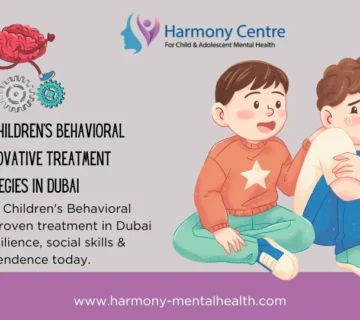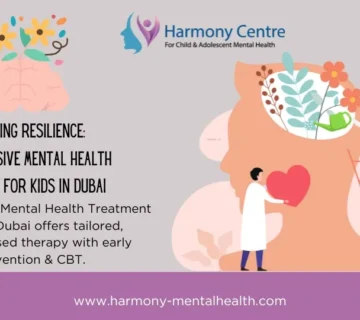Family Conflict Resolution and Communication Skills for Better Child Mental Health in Dubai

Discover family conflict resolution and communication skills strategies in Dubai to improve child mental health and create a harmonious home—book a free consultation now in the UAE!
Effective family communication is the cornerstone of a supportive, nurturing environment that fosters child mental health. In fast‑paced, multicultural cities like Dubai, conflicts and miscommunications at home can significantly impact a child’s emotional well‑being, academic performance, and social interactions. At Harmony Centre, we empower families with evidence‑based conflict resolution and communication strategies that strengthen bonds and promote a harmonious environment. Our integrated approach combines clinical expertise with practical tools to help parents and children navigate challenges, resolve disputes, and build lasting, positive relationships.
Book a Consultation in Dubai Now to discover how our tailored family conflict resolution programs can transform your home environment and support your child’s mental well‑being.
Contact Information
| Contact Method | Details |
|---|---|
| Phone | +971 (52) 8773268 / 04 558 2015 |
| Click Here | |
| info@harmony-mentalhealth.com | |
| Address | Office 409, Building Alrazi-64C, 26th St, Healthcare City, Dubai |
1. Introduction: The Role of Communication in Child Mental Health
Family conflict and poor communication can create stress and anxiety in children, undermining their ability to thrive both at home and in school. In a dynamic and competitive environment like Dubai, where academic pressures and cultural expectations are high, even minor disagreements can escalate, affecting a child’s behavior and emotional stability.
At Harmony Centre, we recognize that resolving conflicts and improving communication within the family are crucial steps toward fostering a healthy environment for children. Our programs are designed to equip families with the tools to express their feelings clearly, manage disagreements constructively, and build a supportive network that enhances every aspect of a child’s life.
Research from the Dubai Health Authority demonstrates that children who grow up in environments with open, positive communication exhibit better emotional regulation, improved academic performance, and stronger social skills. By addressing family conflicts early and teaching effective communication techniques, we help lay the foundation for lifelong mental well‑being.
2. Understanding Family Conflict and Its Impact on Children
Family conflict is a common issue that can arise from differences in opinions, stress from external factors, or miscommunication. When conflicts are not resolved effectively, they can lead to long‑term emotional distress in children, manifesting as anxiety, depression, or behavioral issues.
Common Sources of Family Conflict
- Parenting Differences:
Variations in discipline styles and expectations can create tension between parents and between parents and children. - Communication Breakdowns:
A lack of clear, open dialogue often leads to misunderstandings and resentment. - External Stressors:
Financial pressures, work stress, and external societal influences can exacerbate tensions at home. - Generational Gaps:
Differences in values or lifestyles between parents and children can lead to conflicts that affect a child’s sense of security and self-esteem.
How Family Conflict Affects Child Mental Health
- Increased Anxiety and Stress:
Constant exposure to conflict can make children feel unsafe, leading to heightened anxiety and stress. - Emotional Dysregulation:
Children may struggle to manage their emotions, resulting in outbursts or withdrawal. - Academic Challenges:
Ongoing conflict at home can impair concentration and motivation, negatively impacting academic performance. - Social Difficulties:
Children who experience chronic conflict may have trouble forming and maintaining healthy relationships with peers.
Understanding these impacts is essential for developing effective strategies that promote harmony and support a child’s mental and emotional development.
3. Our Approach to Family Conflict Resolution and Communication Skills
At Harmony Centre, we take a comprehensive, family‑centered approach to conflict resolution and communication. Our programs are designed to address the underlying issues that contribute to conflict, teach practical communication techniques, and provide ongoing support to ensure lasting change.
Key Components of Our Approach
- Comprehensive Family Assessments:
We begin with an in‑depth evaluation of family dynamics through interviews, questionnaires, and observational methods. This helps us identify specific areas where conflict and miscommunication occur. - Customized Treatment Plans:
Based on the assessment, our multidisciplinary team—comprising expert psychiatrists, clinical psychologists, and family therapists—develops a personalized intervention plan tailored to your family’s unique needs. - Practical Communication Skills Training:
Our sessions focus on teaching parents and children active listening, assertive communication, and empathy. Role‑playing exercises, interactive activities, and real‑life scenarios are used to practice and reinforce these skills. - Conflict Resolution Strategies:
We provide structured methods for managing disagreements, including techniques for de-escalation, negotiation, and compromise. These strategies help families resolve conflicts constructively and prevent issues from recurring. - Family Therapy and Parental Guidance:
In addition to individual counseling, our family therapy sessions engage all members in the process of healing and growth. Parental guidance workshops equip parents with tools to support their children’s emotional health and to foster a nurturing home environment. - Integration with School and Community Support:
We collaborate with educators and community resources to ensure that the strategies learned at home are reinforced in the child’s broader social environment.
Our integrated approach ensures that every member of the family is involved in the process of building a more harmonious and supportive home, which in turn enhances your child’s mental health and overall development.
Book a Free Consultation in Dubai Now to experience our personalized, family‑centered approach to conflict resolution and communication skills.
4. Impactful Client Outcomes
Our family conflict resolution and communication skills programs have led to measurable improvements and transformative outcomes for many families. Here are some examples of the positive impacts:
- Enhanced Emotional Regulation:
Families report that children experience a 30–50% improvement in managing their emotions, resulting in fewer outbursts and more constructive behavior. - Stronger Family Bonds:
Through improved communication and conflict resolution, families have seen significant reductions in household tension, leading to a more supportive and nurturing home environment. - Improved Academic and Social Performance:
Children in harmonious homes often display better focus and engagement in school, translating to higher academic achievement and more positive interactions with peers. - Reduced Parental Stress:
Parents equipped with effective communication strategies report feeling more confident in managing family conflicts and supporting their child’s mental health. - Long‑Term Resilience:
The skills acquired through our programs help build a resilient family dynamic that can better withstand future challenges, ensuring sustained well‑being for both children and parents.
These impactful client outcomes, validated by both qualitative feedback and quantitative data, demonstrate the lasting benefits of our family‑centered approach to mental health.
5. Practical Strategies for Enhancing Family Communication
In addition to professional counseling, there are several actionable strategies that families can implement to improve communication and resolve conflicts effectively:
1- For Parents
- Schedule Regular Family Meetings:
Create a routine where all family members can share their thoughts and feelings in a calm, structured environment. - Practice Active Listening:
Focus on truly hearing your child by giving them your full attention, asking open-ended questions, and acknowledging their emotions. - Model Positive Communication:
Demonstrate effective communication through your own interactions. Use clear, respectful language and express your feelings openly. - Implement Conflict Resolution Techniques:
Teach and practice methods such as taking a time-out during heated moments, using “I” statements, and brainstorming solutions together. - Reinforce Positive Behavior:
Use praise and rewards to acknowledge moments of effective communication and conflict resolution.
2- For Children
- Encourage Self-Expression:
Create opportunities for your child to express themselves through art, journaling, or creative play. - Teach Emotional Vocabulary:
Help your child learn to identify and label their emotions. This can be done through stories, games, or guided conversations. - Role-Playing Exercises:
Engage in role-playing scenarios to practice handling disagreements or expressing feelings. This hands‑on practice builds confidence and social skills. - Mindfulness Practices:
Introduce simple mindfulness exercises that can help your child manage stress and stay calm during conflicts.
3- For the Whole Family
- Create a Positive Environment:
Establish routines that include regular shared activities, such as family dinners, game nights, or outdoor walks. - Set Clear Expectations:
Develop a family contract that outlines acceptable behaviors, responsibilities, and consequences for conflicts. Ensure that everyone understands and agrees to these guidelines. - Celebrate Successes:
Recognize and celebrate improvements in communication and conflict resolution. This reinforces positive behavior and builds a sense of unity.
Implementing these practical strategies consistently can create a harmonious home environment where communication flows freely, and conflicts are resolved constructively, leading to lasting improvements in child mental health.
FAQs & Final Thoughts About Family Conflict Resolution & Child Mental Health in Dubai
Final Thoughts about Family Conflict Resolution & Child Mental Health in Dubai
Effective family conflict resolution and communication are essential for fostering a nurturing environment that supports child mental health. At Harmony Centre, our evidence‑based programs empower families to transform conflicts into opportunities for growth, strengthen bonds, and create a positive, resilient home environment. With the right tools and support, every family can overcome challenges and build a foundation for lifelong well‑being.
If you’re ready to enhance your family’s communication and create a harmonious home for your child, Book a Free Consultation in Dubai Now. Let Harmony Centre’s experienced, multidisciplinary team guide you on the journey to lasting, positive change.
For additional resources and further information on child and family mental health services, please visit the Dubai Health Authority website.
Embrace a collaborative approach to family well‑being today—because every child deserves to grow up in a supportive, loving environment
👉 Book a Consultation Now: Call +971 4 558 2015 or visit www.harmony-mentalhealth.com.
Join our online community and stay updated with our latest events, articles about Family Conflict Resolution & Child Mental Health in Dubai


